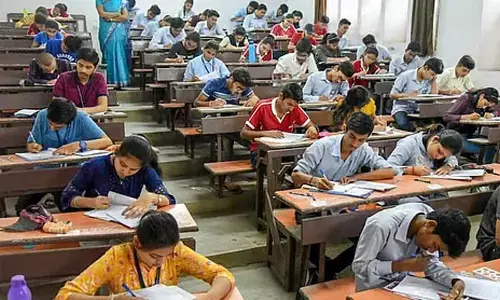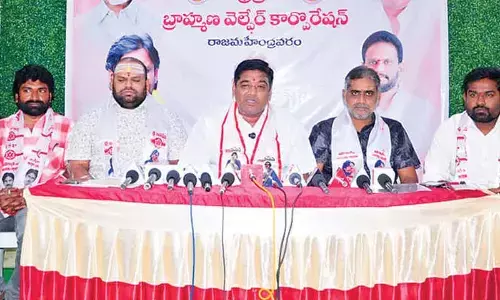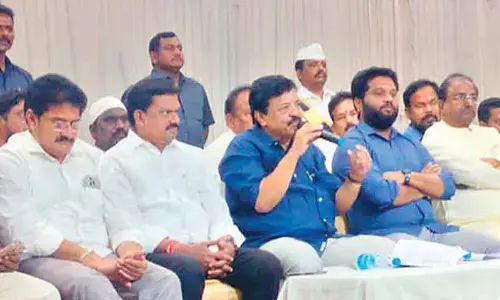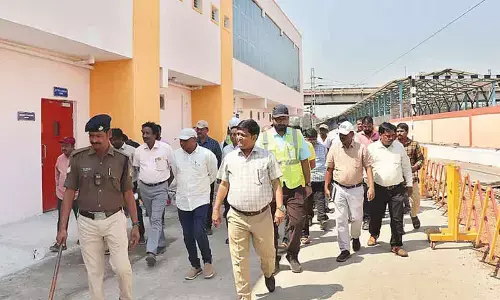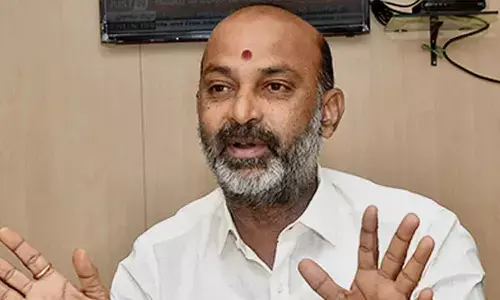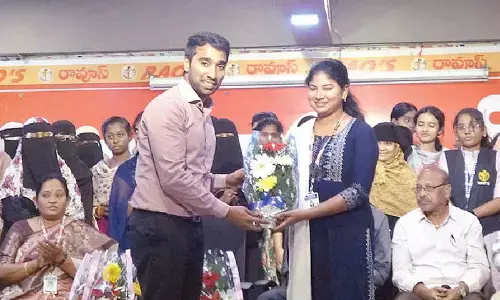NEP should be school-centric
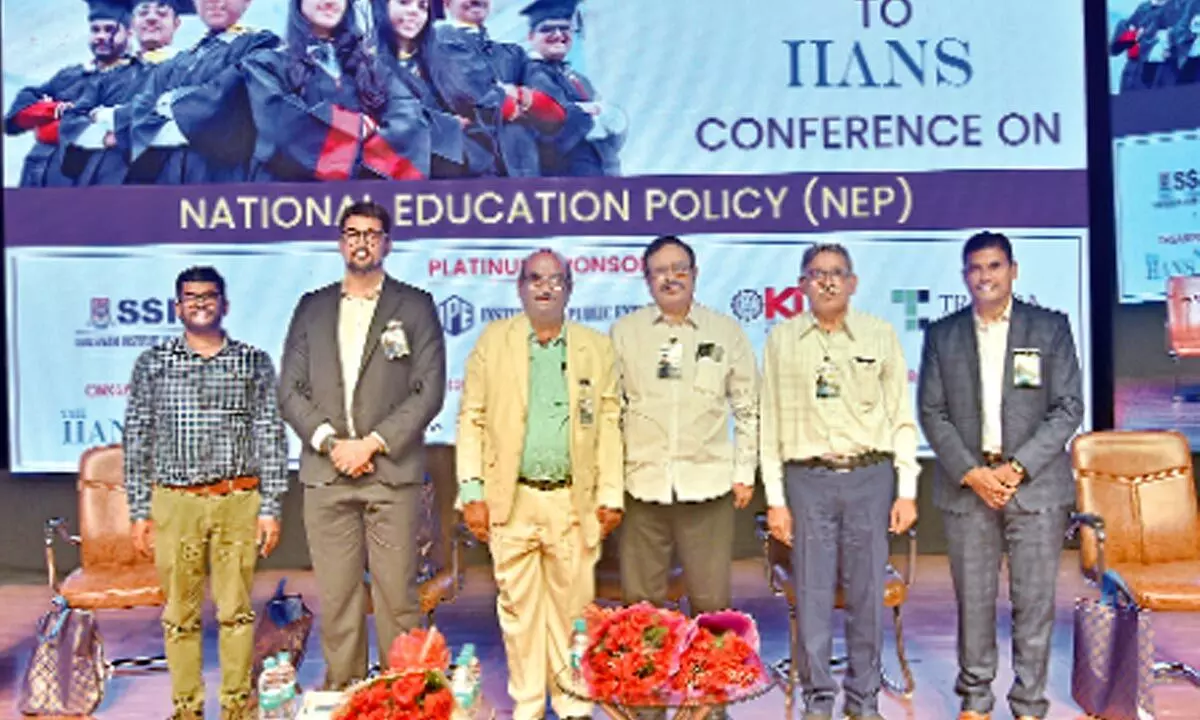
Session- 1 Panelists: Dr Deepak Amban Mishra, Associate Dean Indian Institute of Petroleum & Energy (IIPE), Visakhapatnam, Dr Raul V Rodriguez, Vice President Woxsen University, Prof S Sreenivasa Murthy, Director, Institute of Public Enterprise (IPE) Hyderabad, Prf N V Ramana Rao, Director, National Institute of Technology (NIT) Warangal, Prof DVLN Somayajulu, Director- Indian Institute of Information Technology, Design & Manufacturing (IIITDM), Kurnool and Prof Dr ramesh, Regional director Indira Gandhi National Open University (IGNOU), Hyderabad
Telangana Governor Dr Tamilisai Sounderarajan called upon all the stakeholders to see that while implementing the National Education Policy, special attention was paid towards reforming the school education.
Hyderabad: Telangana Governor Dr Tamilisai Sounderarajan called upon all the stakeholders to see that while implementing the National Education Policy, special attention was paid towards reforming the school education.
Delivering the inaugural address at the two-day Conference on National Education Policy (NEP), challenges and Solutions, the Governor said enrolment in educational institutions would touch 250 million by 2030 and the teacher student ratio would be 1:35. The country needs seven million teachers. Even in Telangana, there is need to fill the vacant teacher posts and replace the contract lecturers. The NEP, she said stresses the responsibility, and accountability of teachers and lays emphasis on the teachers' training. She said the NEP stresses on teaching in the mother tongue, "As a gynaecologist, we recommend to feed a child with mothers milk as it is highly digestive and boosts the imunity of the child. Mother tongue is equally important," she said. Referring to the opposition to the three-language formula in Tamil Nadu, she said till eight years the brain can accept as many words and languages as possible. The world around is becoming challenging.
Learning more language skills would help them get more job opportunities and will also encourage research. The entry and existing options with flexibility help students to shift streams of their interest when they find difficulty in continuing in the courses that they have enrolled for. The NEP focuses on the tradition-to-technology, reaching unreached from the children of the downtrodden to the rich, men and women. "We also need to focus on the tradition, as Dr BR Ambedkar pointed out that unless we read our past history we cannot create our future," she said. The Governor said that when it comes to agriculture nine per cent of universities have agriculture training but less than one percent enrol in the higher education in agriculture. She hoped that the NEP would help in laying greater focus on agriculture.
NEP aimed at building skills
The NEP is aimed at building skills in the subjects that interest the students and it has the flexibility to select subjects across the streams felt Vice President and Deputy CEO Sailesh Sampathy.
Speaking during the inaugural session of the Hans Conference on NEP, Prof Sampathy said that this holistic approach would reduce stress on the students on competitive exams like JEE and NEET or even worrying excessively about X and XII class board exams. It's a boon for students and a big bane for a lot of coaching institutions that depend heavily on stress of a single score. Prof Sampathy said that the skilling of each child during the schooling would increase the stature of skill-based education and increase employability of youth. Promotion of mother tongue in the education system till class V was a welcome step. Children learn best if they learn in their mother tongue, he said.
Need for skilled human resources of high calibre
The increasing private participation in higher education and the impact of globalisation has necessitated marked changes in the Indian Higher Education system. The NEP has broken the glass ceiling and now the role of higher educational institutions has become significant in human resource development and capacity building according to Prof S Jayarama Reddy Chancellor of Sri Chandrasekharendra Saraswathi Viswa Mahavidyalaya. Speaking as Guest of Honour after inauguration of day-2 of the Conference of National Education Policy (NEP), Prof Reddy said serving the cause of social justice, ensuring equity and increasing the access to higher education were a few ways by which higher education instructions can contribute to national development. Prof Reddy said that there was a need to develop skilled human resources of a high calibre. The demand for internationally acceptable standards in higher education was evident. This requires the higher education institutions to be innovative, creative and entrepreneurial in their approach, he said. The new policy aims for an India centric education system that contributes to India enduring into a vibrant equitable and knowledge-based society by providing world class education and it will help check brain drain in the long run, he said.
NEP facilitates freedom from govt
The National Education Policy (NEP) brings freedom from tight government control of higher educational institutions and gives autonomy to the institutions. This will enable them to design degrees, create courses and train students according to Director National Institute of Technology (NIT) Warangal, Prof NV Ramana
He said there was a big change in the knowledge landscape with dramatic technological advances like Artificial Intelligence, data, Machine Learning etc and many unskilled jobs worldwide may be taken over by machines. There is a need for a skilled workforce involved with mathematics, computer science and multi-disciplinary abilities. The NEP 2020 aims to provide the right skills to foster employability to prepare our students for jobs for the future. Whatever jobs available now would be irrelevant in future. Future belongs to hard skills like innovation, robotics etc., he said. Prof Ramana said NEP adaptability, active learning, ethics and creativity. Very important thing is high quality liberal education. In the present system, we have a solo type. A civil engineer cannot go beyond his domain. Now we can choose our curriculum depending on the needs and interests depending on the employment requirement. What is unique about this NEP is that it offers multi entry- multi exits and is multidisciplinary. It also encourages online and offline mode. A candidate can do two degrees simultaneously. This policy is going to make our education on par with international standards.
'Coding' important aspect in the NEP
The KL University Academic Dean S Balaji said that apart from the communication skills, coding was the most important aspect in the National Education Policy. Speaking in the session on 'Role of Public, Private and Industry stakeholders and their partnership,' Balaji said that the government was thinking of imparting C-language for the students of sixth class, which means the sixth standard student would be imparted coding classes. Balaji further said that the NEP was defined based on four pillars including access, equality, accountability and betterment of students. "One of our students recently got an offer from Bosch with a Rs 16 lakh package and when we asked the reason, he said he has done a very good global certification program. We try to involve students in a research course," said Balaji. The most important thing was that the students should be adaptable to the industry after completion of degree, he added.
Need to break paradigm that education is for employment
The Entrepreneur Zone (TEZ) Founder and MD Nandita Sethi said that there was a need to break the paradigm that education was for employment. Speaking in the session on 'Role of Public, Private and Industry stakeholders and their partnership' on day two of the Hans Conference on NEP, Nandita Sethi said "We have heard about students getting placed but we rarely heard about the startup they had. We hear about the delivery of the curriculum, pedagogy, placement cell etc is booming but when we look at the incubator they just don't know what to do with it."
Philanthropic angle is must
FICCI Ladies Organisation (FLO) Chairperson Shubhraa Maheshwari stressed on the need to have philanthropic angle in the education system.
Shubhra said that India was the land of intellectuals and the only thing needed was the right tool. She said that learning was a never ending process. NEP is not so easy when it comes to implementation though it could be a game changer, she added.
NEP will make students industry-ready
The Axis Clinicals Limited- Aurobindo Group head Human Resources Kingsley Kurien said that the National Education Policy would make the students industry ready by focusing on the skills and personality development. Speaking in the session on 'Role of Public, Private and Industry stakeholders and their partnership' on day two of the Hans Conference on NEP, Kurien said that the education has to be accessible to all. The NEP is aiming at reaching everyone. "As far as the industry perspective, we get a lot of brilliant candidates but many of them lose out because they are not very confident enough while facing interviews. They are not able to explain. Personality development which always makes them industry ready and the NEP will help in this aspect," said Kurien.
Skills required to be job-ready
Dr Deepak Amban Mishra, Associate Dean of Indian Institute of Petroleum & Energy (IIPE), Visakhapatnam said, "Undergraduate degree programmes of either 3 or 4-year duration, with multiple entries and exit points and re-entry opportunities would reduce the pressure on students. He said that accessibility to industries will also increase with the NEP as the students would have learned the skills required to get a job.
An investment opportunity for a social cause
Indian Institute of Technology Hyderabad Head of the Department MP Ganesh said that the Corporates should look at this as an investment opportunity for a social cause.
Speaking in the session on 'Role of Public, Private and Industry stakeholders and their partnership' on day two of the Hans Conference on NEP, Ganesh said that the social investments are also going to help business and corporations in the long run. Corporates can contribute to faculty development. Faculty can go to work as interns. If that kind of opportunity is given to faculty they can do a lot of wonders not just for academic institutions but also Corporates.
NEP's four skills key to success
NEP brings four essential skills that are required to be successful in the 21st century. The fours skills are learning to know, learning to be, learning to do and learning to live together. How fast, flexible, and dynamic these four skills are adopted by the students will decide on the pace of development, saying this is the benchmark for the learner of the 21st century according to Prof Dr Ramesh, Regional Director of Indira Gandhi National Open University (IGNOU), Hyderabad. He said, "NEP is breaking all barriers that the education system earlier had, the new policy is bringing common norms for private and public, no need of affiliation the universities can formulate courses as per the decision of the academic council."
Train stakeholders
Dr Raul V Rodriguez, Vice President of Woxsen University said that teachers, faculty members, and all department stakeholders need to be trained for NEP that includes training on dual degree, credit transfer, assurance of learning and multi-disciplinary education. He said that all individuals should be aware of the benefit of the implementation of NEP and enough awareness has to be created so that students can get benefited from the new skills, programmes, courses and degrees that are being introduced by the universities after the implementation of NEP.
NEP will effect paradigm change
Proper implementation of NEP will bring paradigm change in the education system and Industries would start going the Universities rather than institutions going to Industry said VIT Andhra Pradesh Vice Chancellor S V Kota Reddy. Speaking during the inaugural session of the Conference on NEP, Kota Reddy said in Stanford, the Industry came to University and also set up a lab in the University. "We see in the Western Universities, product development happens in the University followed by mass production in the industry. In India in terms of patent publications we are tenth in the world," he said. Kota Reddy said that there was a lot of flexibility in the NEP even if a student drops out one year after joining a course, he can get a certificate if he has earned 40 credits. After doing 80 credits (two years) they can get a diploma, after doing 120 credits they can get a Bachelor's Degree and after 160 credits (fourth year) engineers degree.
NEP is a bold policy
The Research and Innovation Circle of Hyderabad (RICH) Director General Ajit Rangnekar said that the new education policy was very honest and blunt about the current shortcomings in the education system. Speaking in the session on 'Role of Public, Private and Industry stakeholders and their partnership' on day-two of the Hans Conference on NEP, Rangnekar said he was impressed with the honesty of the government. Rangnekar said, NEP has a vision and is a bold policy. However, he opined that the education system was not ready for the sweeping changes just as the industry was not ready for reforms during the 1991 reforms. They somehow managed to cope up and now the educational institutions would also have to manage this.
Industry, academia should focus on intervention
Tata Consultancy Services (TCS), Hyderabad Vice President and Regional Head Rajanna stressed on the need for the industry and academia to focus on the interventions. Speaking in the session on 'Role of Public, Private and Industry stakeholders and their partnership' on day two of the Hans Conference on NEP, Rajanna said that India was a greatest talent house. There were gaps and there will be gaps but there should be interventions by the industry and academia. Talking about the IT sector, Rajanna the IT sector contributes nine per cent of the GDP. There are five million direct employment. He said that the Hyderabad IT sector provides employment to 7.7 lakh people directly and it has registered a growth of 26 per cent in the sector last year.
The best feature of NEP is flexibility of the courses
Dual degree system is like riding on two horses. It is a challenge. One has to be cautious while selecting the subjects. The students should know whether they are getting specialisation or diluting it. This was one of the challenges posed by NEP said Prof S Sreenivasa Murthy, Director Institute of Public Enterprise (IPE). Speaking during the inaugural session of the Conference on NEP, Prof Sreenivasa Murthy said, industry always wants quality product. Pedagogy is very crucial. When they complete the course, students should be ready to be accepted by the industry. The industry doesn't want to spend time on training. Right from day one, they should be ready to take up the jobs, he added. Prof Murthy said that one of the best features of NEP was the flexibility of the courses. The students, who discontinued the courses for some reason or the other can join back. India is the only country which can be proud of value-based education, he added.
Profiteering is wrong
Eco Ventures Founder and MD Ashish Naredi said that the education sector can have profits but not profiteering. Speaking during the session on 'Role of Public, Private and Industry stakeholders and their partnership,' Ashish said that the NEP says education will continue to be not for profit but the ground situation is different. "We have a school which has its headquarters in the British Virgin Islands. Irony is if you ask not to make profit, it will make more." Private participation will come. Let there be profit but there should not be profiteering, he said. He suggested that there could be an independent regulator.
Education will be transformed
The National Education Policy (NEP) is a step toward high-quality liberal education with board multi-disciplinary exposure and this new policy will bring transformations in the education system said Prof DVLN Somayajulu, Director of the Indian Institute of Information Technology, Design and Manufacturing (IIITDM). Speaking on the topic of Implementation of the Dual Degree and Credit Transfer Eco-system,' he said NEP will offer students to select teachers and set up timings accordingly, providing flexibility, and quality by allowing students to frame their courses. At present many of the jobs that people are doing have no link to what they studied. With NEP students can choose their own course, he said. "The main objective of NEP according to him was to reduce the overload of curriculum on the students and give greater flexibility to students. The present system is teachers preparing lessons by referring to different books and deliver knowledge in the classroom, but now it will be transformed as the teacher's role is to motivate students to construct knowledge.
Respond to vision
Mahindra University School of Management Dan Prof Ramakrishna Velamuri stressed on the need to have collaboration of industry and academia and coordinated effort by all the stakeholders. Prof Ramakrishna said that there were very few Corporations that take a strategic perspective on engaging with academia. He called upon the industry to achieve the goals of NEP. The government has taken the first step by setting up policy, which is very broad and grand in its vision and now we have to respond to it , he said.


